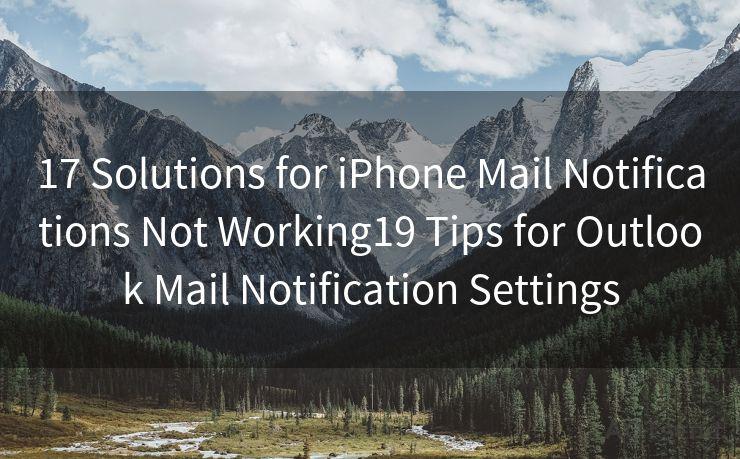18 Amazon WorkMail API Best Practices
Hello everyone, I’m Kent, the website admin. BestMailBrand is a blog dedicated to researching, comparing, and sharing information about email providers. Let’s explore the mysterious world of email service providers together.




1. Introduction to Amazon WorkMail API
Amazon WorkMail, a secure, managed business email and calendaring service, offers an extensive API for developers to integrate and extend its functionality. To make the most of this powerful tool, it's essential to follow best practices. In this article, we'll explore 18 key best practices for using the Amazon WorkMail API effectively.
2. Understand the API Basics
Before diving into the API, it's crucial to understand its fundamentals. Familiarize yourself with the API's endpoints, request and response formats, and authentication mechanisms. This knowledge will serve as a solid foundation for further explorations.
3. Secure Your Credentials
Protect your API credentials like your life depends on it. Use AWS Identity and Access Management (IAM) to create and manage access keys securely. Never hardcode credentials in your applications or expose them publicly.
4. Use the Latest API Version
Always use the latest version of the Amazon WorkMail API to ensure you have access to the newest features and improvements. Older versions may become deprecated and could pose security risks.
5. Handle Errors Gracefully
The API may return errors due to various reasons, such as invalid requests or service limitations. Implement robust error handling mechanisms to manage these situations gracefully and provide meaningful feedback to users.
6. Optimize Your Requests
Minimize the number of API calls by batching requests when possible. This not only reduces the load on the API but also improves the efficiency of your application.
7. Utilize Pagination
When fetching large datasets, utilize pagination to retrieve data in smaller chunks. This approach helps avoid timeouts and memory issues, ensuring a smoother user experience.
8. Monitor API Usage
Regularly monitor your API usage to identify patterns and potential bottlenecks. AWS CloudWatch and other monitoring tools can provide valuable insights into your API consumption.
9. Implement Caching Strategies
Caching frequently accessed data can significantly improve performance and reduce unnecessary API calls. Consider using caching mechanisms like Redis or Memcached to store frequently accessed information.
10. Test in a Sandbox Environment
Before deploying to production, test your API integrations in a safe, sandboxed environment. This allows you to experiment and iterate without affecting live services.
11. Follow Rate Limiting Guidelines
Respect the API's rate limits to avoid throttling or service denials. Implement backoff strategies to handle rate limit exceptions gracefully.
12. Keep Up with Documentation
The Amazon WorkMail API documentation is constantly evolving. Stay up to date with the latest changes and best practices by regularly checking the official documentation.
13. Leverage SDKs and Libraries
Utilize official AWS SDKs and libraries, which provide abstractions and helpers to simplify API interactions. These tools can save you time and reduce the complexity of your code.
14. Validate Input Data
Always validate and sanitize input data before making API requests. This helps prevent potential security risks and ensures data integrity.
15. Use Strong Encryption
When transmitting sensitive data through the API, ensure you're using strong encryption protocols like TLS to protect the information in transit.
16. Log and Audit API Activity
Maintain detailed logs of all API activity for auditing and troubleshooting purposes. This practice aids in compliance and can help identify unusual patterns or potential breaches.
17. Prepare for Outages and Failures
Design your application to be resilient against API outages or failures. Implement fallback mechanisms and ensure your system can gracefully handle such situations.
18. Stay Engaged with the Community
Participate in the AWS and Amazon WorkMail communities to stay informed about best practices, upcoming changes, and potential issues. These communities are a valuable resource for knowledge sharing and problem-solving.

By following these best practices, you can maximize the effectiveness of your Amazon WorkMail API integrations, ensuring a secure, efficient, and reliable experience for your users.
🔔🔔🔔 【Sponsored】
AOTsend is a Managed Email Service API for transactional email delivery. 99% Delivery, 98% Inbox Rate.
Start for Free. Get Your Free Quotas. Pay As You Go. $0.28 per 1000 Emails.
You might be interested in:
Why did we start the AOTsend project, Brand Story?
What is a Managed Email API, How it Works?
Best 24+ Email Marketing Service (Price, Pros&Cons Comparison)
Best 25+ Email Marketing Platforms (Authority,Keywords&Traffic Comparison)




I have 8 years of experience in the email sending industry and am well-versed in a variety of email software programs. Thank you for reading my website. Please feel free to contact me for any business inquiries.
Scan the QR code to access on your mobile device.
Copyright notice: This article is published by AotSend. Reproduction requires attribution.
Article Link:https://www.bestmailbrand.com/post5637.html











